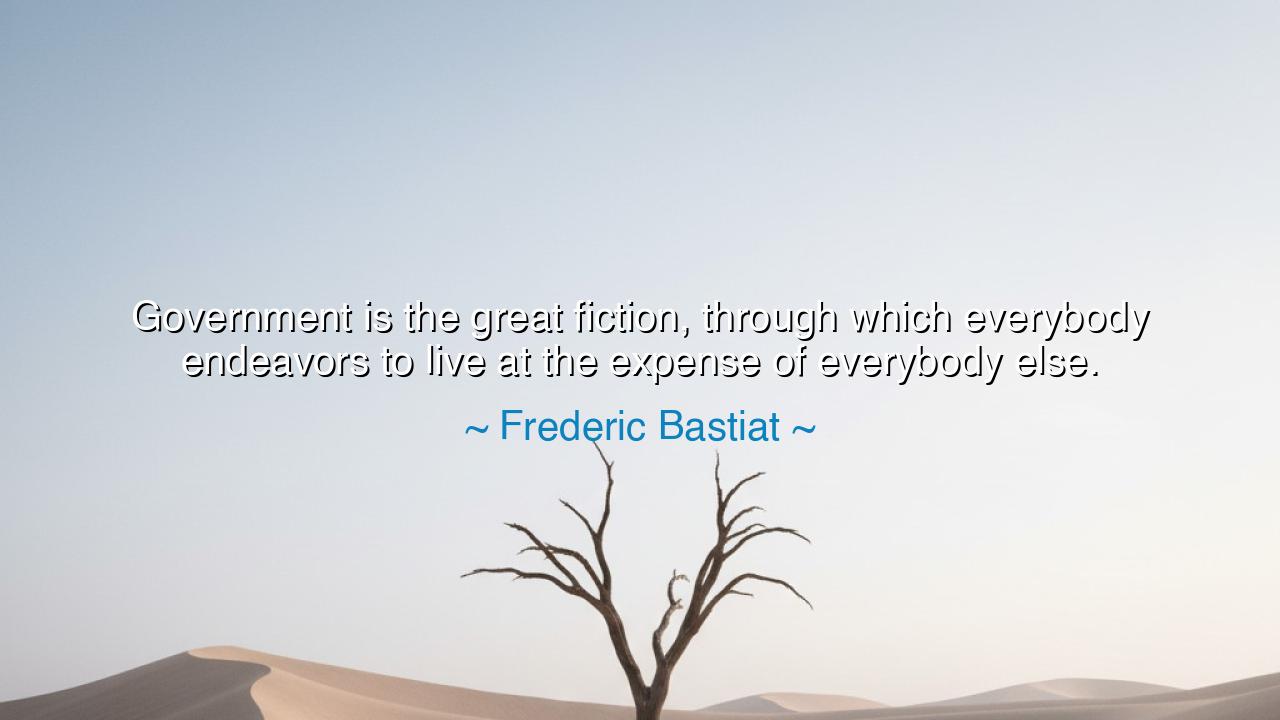
Government is the great fiction, through which everybody
Government is the great fiction, through which everybody endeavors to live at the expense of everybody else.






When Frédéric Bastiat wrote, “Government is the great fiction, through which everybody endeavors to live at the expense of everybody else,” he was not jesting; he was revealing a moral truth that echoes through the ages. Bastiat, the 19th-century French economist and philosopher, saw clearly what many are too comfortable to admit: that the state, when corrupted by greed and dependency, becomes a grand illusion — a theater in which each class, each group, each citizen seeks to plunder his neighbor under the banner of legality. It is a fiction because it disguises self-interest as justice, and theft as benevolence. Beneath its noble phrases of “public good” and “national welfare,” it conceals the oldest human vice — the desire to reap without sowing.
The origin of this quote lies in Bastiat’s fierce defense of liberty during the mid-1800s, a time when France was awash with political upheaval, revolutions, and the growing promises of socialism. He observed how the people, disillusioned by monarchies yet intoxicated by democratic rhetoric, began to demand more and more from the government — as though it were a divine provider, capable of giving everything to everyone. But Bastiat saw the inevitable consequence: that for government to give to one, it must first take from another. Thus, what was called “public spending” was merely organized coercion, and what was called “social justice” often became legalized injustice.
To Bastiat, this “great fiction” was more dangerous than a tyrant’s rule. For tyranny declares itself openly — it oppresses by the sword. But the fiction of benevolent government seduces through comfort. It teaches citizens to look not inward, toward effort and virtue, but outward, toward subsidy and entitlement. In this way, nations forget that government produces nothing; it merely redistributes what individuals create. Bastiat’s insight is therefore both economic and moral: when people expect the state to provide all, they become both the thieves and the victims of their own design.
History offers abundant confirmation of his warning. Consider the fate of the Roman Empire, which began as a republic of virtue and discipline but decayed into dependency and excess. When its citizens ceased to labor for their sustenance and instead demanded “bread and circuses” from the state, the treasury emptied, taxes soared, and liberty vanished. The people had traded self-reliance for comfort, and the empire that once conquered the world collapsed under the weight of its own consumption. Rome did not fall by invasion alone — it rotted from within, poisoned by the same fiction Bastiat exposed: the belief that one can live endlessly at another’s expense.
Modern times tell the same tale in new forms. Governments grow vast, debts swell beyond measure, and citizens grow accustomed to benefits paid not by productivity but by borrowing against the future. Politicians promise gifts they cannot fund, industries seek favors instead of excellence, and individuals barter independence for security. In this grand illusion, everyone imagines themselves as the beneficiary, yet all become the burden-bearers. Bastiat would look upon the modern welfare state or the corporate bailout and say, with weary clarity, “The fiction remains unchanged; only its disguise has grown more elaborate.”
Yet Bastiat’s words are not a counsel of despair — they are a call to awakening. He reminds us that freedom and responsibility are inseparable twins. A just society cannot be built upon envy, nor can prosperity arise from dependency. True progress flows not from redistribution, but from creation — from the individual who labors, innovates, and gives value to others through voluntary exchange. To reject the “great fiction” is to reclaim the moral dignity of self-reliance, to see government not as a parent but as a servant, and to restore the harmony between liberty and justice.
The lesson is eternal: when citizens cease to see government as a power to be limited and begin to see it as a treasure to be divided, the nation’s freedom begins to die. Each man who demands more from the state than he contributes becomes a silent accomplice in the erosion of liberty. Thus, the path forward is not revolution, but reformation — a return to principle, to personal virtue, to the understanding that the wealth of a nation lies in its people, not its politicians.
So let us remember Bastiat’s wisdom: the state has no wealth but what it takes from the people, and no virtue but what the people demand of it. Do not seek to live at your neighbor’s expense, nor allow your leaders to promise you what they must first steal from another. Let your labor be honest, your charity voluntary, and your freedom guarded with vigilance. For only then will the great fiction fade — and truth, like the dawn, return to light the world of men.






AAdministratorAdministrator
Welcome, honored guests. Please leave a comment, we will respond soon